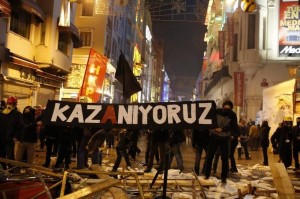Regime crisis in Turkey
The corruption scandal surrounding Turkey’s AKP government and Prime Minister Tayyip Erdogan have developed into a full-fledged regime crisis, reports Mark Bergfeld.
When the Gezi protests swept the Turkish state in June 2013 peoples from all ethnic, religious and political background articulated themselves and their demands through the social movement in an unprecedented way. Unfortunately they were not able to break Erdogan’s hegemony. In many ways, Erdogan was able to continue to rule in the same way. Even his remarks that the Gezi protests were “a foreign plot” did not necessarily harm him or the AKP.
Erdogan has been ruling the Turkish state for the last decade. His rule is ‘hegemonic’ in the true sense of the word. His use of Islamic-conservative values has successfully tied in sections of the popular classes. His alliances with business men and capitalist entrepreneurs have helped to finance the party. In turn, high levels of economic growth have left some crumbs for those at the bottom of Turkish society.
So far more than 24 people have been arrested in the course of the last week including the CEO of Halk Bank CEO who had kept more than $4.5million in laundered money in shoe boxes. Erdogan might have replaced ten (out of 26) government ministers but the crisis is nearing him with rapid pace. Yesterday’s leak named one of his sons as under suspicion for fraud. Tayyip Erdogan’s hat-trick to blame “foreigners” for the crisis will not pull this time.
While Erdogan might have been able to restore stability after the Gezi protests, he will not succeed this time round.
Firstly, the markets have spoken. Since the first arrests on 17 December the stock markets have plummeted by more than ten per cent. The Turkish Lira is at an all-time low. Any re-bound will happen after the March elections. This will hit Erdogan where it hurts.
Secondly, the power struggle between Erdogan and his former friend and self-exiled Islamic preacher Fetulleh Gülen are a mediated expression of rifts within a particular section of the ruling class. This rift is only exacerbated by old rivalries between the military, the judiciary and other sections battling for power in the run-up to the March 2014 elections. The military has vowed that it will not interfere in the crisis gripping the government. But would you ever trust the military officers?
Thirdly, the Gezi protests opened up the space for a new political imagination inside the Turkish state. Whether one likes it or not the scandal now opens up a new space for the main opposition party, the CHP. Unless Erdogan himself is forced to resign in the coming days, this space will also allow new alternatives from below to fill the space in the upcoming elections.
Last but not least, the crisis could put the Kurdish peace process on ice. The gains made during the negotiations might be endangered. The Kurdish question could develop into a new fault line as actors hostile and favorable to the Kurdish cause will try to re-negotiate the question on new terms.
For those who have followed the Gezi protests it would be interesting to see how the actors who were involved in June’s uprising will seek to accelerate the unraveling of the AKP government. How they will seek to address the question of government corruption – a terrain most favorable to technocratic solutions? Will they be able to develop political alternatives?
The crisis unfolding in Turkey goes beyond a governmental crisis. It truly is a regime crisis which will shape Turkey in years to come. The question is whether those forces who carried the Gezi movements and established alternatives at that moment are capable of shifting the the parameters of Turkish politics once and for all.
This article was first published on Mark Bergfeld’s blog.
Left Unity is active in movements and campaigns across the left, working to create an alternative to the main political parties.
About Left Unity
Read our manifesto
Left Unity is a member of the European Left Party. 
Read the European Left Manifesto
ACTIVIST CALENDAR
Events and protests from around the movement, and local Left Unity meetings.

Saturday 10th January: No to Trump’s war on Venezuela
Protest outside Downing Street from 1 to 3pm.
More events »
GET UPDATES
Sign up to the Left Unity email newsletter.
CAMPAIGNING MATERIALS
Get the latest Left Unity resources.



